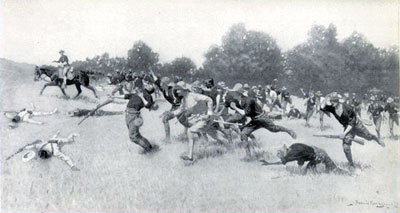|
Introduction
When
the United States entered into the conflicts in Cuba,
Puerto Rico and the Philippine Islands in the late nineteenth
century, it was abandoning its original policies of not
becoming directly involved in wars with European colonial
powers, and it was aligning itself politically with England
(against Spain). This ideological shift transformed aspects
of the social structure and culture as well. The US was
already a multicultural nation and this attempted homogenisation
of identity and the new imperialistic role was problematic
for many non-Anglo communities. For Irish/Catholic New
Yorkers, the reconfiguration would be more serious. Many
had come to the Americas to escape Anglo hegemony and
believed that emphasis on Anglo culture would hinder their
ability to negotiate a place in the US power structure.
US support for England was an overt attempt to downplay
the Irish presence in the United States and to justify
their marginalisation. The same rationale of Anglo superiority
would later be used to deny independence to Puerto Rico
and the Philippines after the War.
…Anglo-Saxon racism was a chic ideology in American
Universities, drawing rooms, and private clubs.[…] Survival
of the Fittest Social Darwinism, another English import,
provided a scientific and sociological framework for Anglo-American
nativists. They not only used it against ‘inferior breeds’
in the United States, but as a propaganda weapon justifying
military and economic imperialism in Latin America and
in the Far East, claiming that America was bringing the
advantages of a superior civilization to the benighted
savages of an underdeveloped world. (McCaffrey 1976: 113)
This resurgence of kinship with the British would also
justify an imperialistic stance to which some of the Irish
were vehemently opposed due to their own long history as a British colony.
Randolph Hearst and Joseph Pulitzer primarily viewed the
war and the occupation of Puerto Rico and the Philippines
as a way of promoting their publications. However, Patrick
Ford, who ran the Irish World from 1870-1913,
Patrick Meehan, who edited the Irish-American
from 1857-1906, and Finley Peter Dunne, whose syndicated
column was published throughout the nation, believed that
US imperialistic endeavours had important consequences
which contradicted their ideas of what the US should represent.
Several generations of Irish and US-born Irish (who came
from a variety of backgrounds) coexisted in New York;
and there was no single Irish viewpoint on all the issues
involving the War. However, the majority of these Irish
viewed US Imperialism in the Philippines and Puerto Rico
as an ‘anti-American’ idea and the sympathy that they
had for the Cubans, Filipinos and Puerto Ricans stemmed
from their own history as a colony of England.
However, the events leading up to the war and the resulting
surge of US nationalism which occurred during the battles,
split Irish opinion and often challenged the idea that
Irish communities could be US citizens and still remain
loyal to Ireland. The Irish viewed US imperialism as one
of the consequences of an assertion of Anglo traditions
and an attempt to negate all other nationalities and ethnicities.
The war brought issues of citizenship and human rights
to the fore, and forced the Irish in the US to align themselves
with other ethnic groups in way that they had not been
inclined to do previously.
In the late 1800s many new Irish immigrants were still
arriving in the US and by early 1900, the Irish population
amounted to nearly five million people (Miller 1985: 493).
The New York, The Irish World and American
Industrial Liberator, and The Irish-American were the
two newspapers that the New York Irish were most likely
to read. By the 1870s The World was more widely
read than The Irish-American (which had previously
been the most popular paper among the Irish communities)
and ‘by the eighteen nineties and early twentieth century
the circulation was regularly listed at 125,000”(Rodechko
1967: 525). The paper also had a significant readership
outside New York.
Patrick Meehan shared Ford’s belief that Ireland should
be liberated from England. However, the two men often
differed on the methods of achieving liberation, which
led them to advocate different causes in the US. Ford
supported the US labour movements and believed that social
mobility in the US would empower US-Irish to fight England,
while Meehan was a Catholic who tried to reconcile Catholic
doctrine with Irish freedom movements. Both Ford and Meehan
supported the idea that aligned Irish identity with the
Catholic Church and reported extensively on Church events
in the US and in Ireland; however, the primary focus of
these papers was news related to Ireland. They also reported
on US-Irish concerns about the consequences of a war with
Spain and their sympathy for the Caribbean and Philippine
Islands is apparent. Ford saw the similarities between
Irish and Cuban/Puerto Rican history and his extensive
coverage reflected on the parallels of the situations.
|

